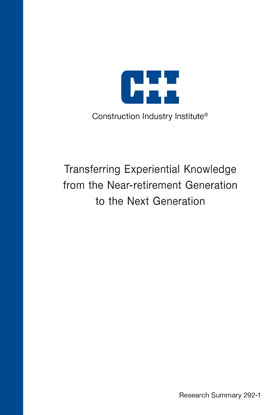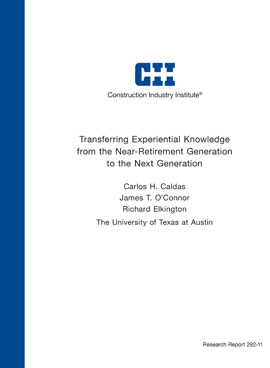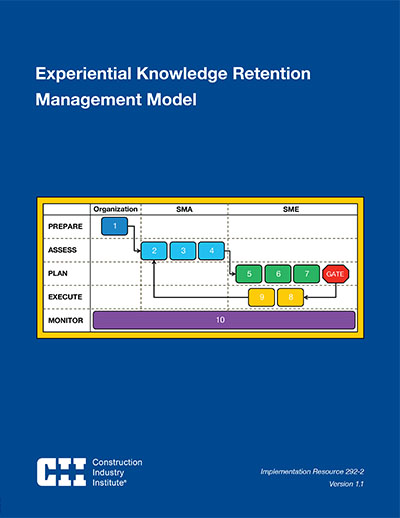
Transferring Experiential Knowledge from the Near-retirement Generation to the Next Generation
As the Baby Boomer generation nears the traditional retirement age of 65, organizations in most industries are finding themselves facing a potential mass exodus of their most senior and experienced employees; the situation in the capital projects industry is no exception. As is true in all industries, potential retirees in the construction industry have a knowledge inventory accrued through a career of successes and failures in their field. This knowledge base is often the foundation of decisions that enhance operational efficiency, foster innovation, reduce the occurrence of critical errors, and enable corporate growth strategies. Traditional human resources practices aim at replacing the individual and often do little to consider how their wealth of experiential knowledge can be retained prior to their departure. Not only does this practice affect an organization’s capacity to operate effectively, but in addition to the new hire’s salary, the cost of replacing an experienced individual with someone from the outside can range, anywhere between 50 percent to 150 percent of the salary in various indirect turnover costs.
CII formed Research Team 292, Transferring Experiential Knowledge from the Near-retirement Generation to the Next Generation, to address the increased rate of knowledge loss in the capital projects industry; the study was chartered to aim at the retention of experiential knowledge that is at risk of loss due to retirements. RT 292 investigated the current state of the industry’s experiential Knowledge Management (KM) in order to understand its knowledge transfer problem in terms of magnitude and dynamics, and to isolate the contributing factors and barriers to success. In the course of its research efforts, the team gained an understanding of the value added through effective experiential knowledge retention, developed a framework of an effective experiential knowledge retention model, and formulated of a customizable knowledge retention program.
The team conducted interviews, surveys, and case studies, and consulted heavily with industry knowledge management and human resources experts to frame the problem and understand what constitutes a successful experiential knowledge retention program. The result is a knowledge retention model that, at a high level, has the following functions:
- aids in the implementation and preparation of a corporate knowledge retention program
- assesses current risk of experiential knowledge loss across organizational knowledge areas called Subject Matter Areas (SMA)
- identifies at-risk individuals whose departure would result in the loss of considerable experiential knowledge
- provides a mechanism for effectively planning to transfer/retain the knowledge at risk
- offers guidelines for implementing the plan.
The model also includes suggestions for monitoring and improving the model as a whole, as it progresses through the various levels of granularity, from companywide to individual Subject Matter Experts (SME). The model details are available in CII Implementation Resource (IR) 292-2, Implementing an Experiential Knowledge Retention Management Model. The implementation of the model outlined in IR 292-2 will help organizations shift from a reactive response to knowledge loss and retirement to a proactive knowledge-sharing culture that minimizes the impact of retirements.
The accelerated loss of knowledge due to Baby Boomer retirements is uniquely and dramatically affecting the capital projects industry.
The capital projects industry is experiencing a dramatic increase in the departure rate of experienced people from the workforce; this is due to the large number of retirements from the Baby Boomer generation and a shortage of qualified workers able to fill the resulting employment gap. (RS292-1, p. 1)
The operational effects of a knowledge gap within an organization include the following: reduced efficiency, an increase in the number of critical errors, a reduced ability to innovate, and a reduced ability to pursue growth strategies.
{^widget|(widget_displayname)WatermarkImage|(name)WatermarkImage|(image)%7e%2fCII%2fmedia%2fPublications%2f292_2Figure1-2.png%3fext%3d.png|(width)|(height)^}
Demographics are not the sole contributor to the knowledge management difficulties of the capital projects industry. Project based organizations, especially organizations with short project cycles, see knowledge generated, re-invented, and lost as teams are formed and later broken up to work on new projects. This is an additional challenge that must be overcome, and provides motivation for project based organizations to develop strong knowledge sharing cultures.



